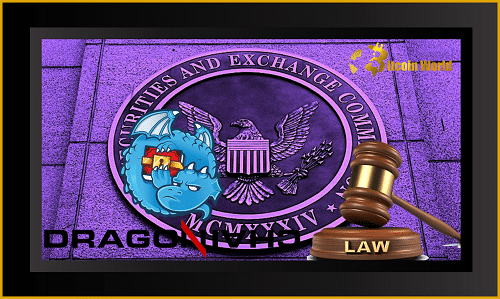The world of cryptocurrency is no stranger to regulatory scrutiny, and the latest entity to find itself in the crosshairs of the U.S. Securities and Exchange Commission (SEC) is Dragonchain. Think of it as another ripple in the ever-turbulent crypto market, but this time, it’s Dragonchain facing allegations of conducting an unregistered cryptocurrency offering to the tune of $16.5 million. Let’s dive into the details of this unfolding legal battle.
What Exactly Happened with Dragonchain and the SEC?
On August 16, 2022, the SEC officially filed a lawsuit in the Western District of Washington U.S. District Court, naming Dragonchain Inc., Dragonchain Foundation, The Dragon Company, and their founder, John Joseph Roets, as defendants. The core of the SEC’s argument? They allege that these entities illegally offered and sold DRGN tokens without proper registration, raising a significant sum from investors worldwide.
Here’s a breakdown of the key allegations:
- Unregistered Offering: The SEC claims the defendants conducted an unregistered offering of DRGN tokens.
- Significant Funds Raised: Approximately $16.5 million was raised through these sales.
- Timeline of Sales: The offering occurred in two phases: an initial coin offering (ICO) in 2017 and subsequent sales between 2019 and 2022.
- Investor Reach: The 2017 ICO alone involved roughly 5,000 investors globally.
- Use of Funds: The SEC states that the funds were used for the development and promotion of Dragonchain technology and general operating costs.
The SEC isn’t pulling any punches. They are seeking serious repercussions, including:
- Permanent Injunctions: To prevent the defendants from engaging in similar activities in the future.
- Disgorgement with Prejudgment Interest: Requiring the defendants to return the allegedly ill-gotten gains, plus interest.
- Civil Fines: Monetary penalties for the alleged violations.
- Conduct-Based Injunctions: Specific restrictions on the defendants’ future conduct.
Is This the Crypto Wild West All Over Again?
For those following the cryptocurrency space, the SEC’s action against Dragonchain might feel like déjà vu. The regulatory landscape for digital assets is still evolving, leading to ongoing debates about which tokens qualify as securities and thus fall under the SEC’s jurisdiction. The core issue here is whether DRGN tokens should have been registered as securities before being offered to the public.
Dragonchain vs. SEC: Echoes of the Ripple Case?
The SEC’s lawsuit against Dragonchain immediately draws parallels to their high-profile case against Ripple Labs. Remember that saga? Back in December 2020, the SEC charged Ripple, along with its CEO Brad Garlinghouse and co-founder Chris Larsen, for allegedly conducting a $1.3 billion unregistered security offering with their XRP token.
The Ripple case is still ongoing, a testament to the complexities and legal nuances involved in classifying cryptocurrencies. Ripple has vehemently denied the SEC’s claims, arguing that XRP is not a security. This defense hinges on the idea that XRP doesn’t meet the criteria of the Howey Test, a legal framework used to determine if an asset qualifies as an investment contract and therefore a security.
The Dragonchain case could very well follow a similar trajectory, with potential arguments revolving around the nature of the DRGN token and whether investors had a reasonable expectation of profit based on the efforts of the Dragonchain team. The outcome of both cases could have significant implications for the broader cryptocurrency market, setting precedents for future regulatory actions.
What Does This Mean for Crypto Exchanges?
The SEC’s focus isn’t solely on token issuers. Cryptocurrency exchanges are also under increasing scrutiny. Take, for instance, the recent investigation into Coinbase, one of the largest crypto exchanges globally. The SEC is reportedly examining whether some of the tokens listed on Coinbase are, in fact, unregistered securities.
This increased regulatory pressure highlights the delicate balancing act that crypto exchanges face. They need to provide a wide range of trading options to attract users, but they also need to ensure they are complying with securities laws. Listing tokens that are later deemed securities by the SEC can lead to significant legal and financial repercussions.
Navigating the Regulatory Maze: Key Takeaways
The Dragonchain lawsuit, alongside the ongoing Ripple case and the Coinbase investigation, underscores the growing regulatory attention on the cryptocurrency industry. Here are some key takeaways:
- Regulatory Uncertainty Persists: The lack of clear and consistent regulations remains a significant challenge for the crypto industry.
- SEC Scrutiny is Intensifying: The SEC is actively enforcing existing securities laws in the digital asset space.
- The Howey Test is Central: The classification of tokens as securities often hinges on the interpretation of the Howey Test.
- High Stakes for Token Issuers and Exchanges: Non-compliance can lead to hefty fines, injunctions, and reputational damage.
- Impact on Investors: Regulatory actions can impact the value and liquidity of digital assets.
Looking Ahead: What’s Next for Dragonchain and the Crypto Market?
The legal battle between Dragonchain and the SEC is just beginning. It could take months, or even years, to reach a resolution. The outcome will be closely watched by the entire cryptocurrency community, as it could provide further clarity on the regulatory landscape for token offerings.
For crypto traders and investors, it’s a reminder of the inherent risks and uncertainties associated with this asset class. Staying informed about regulatory developments and understanding the legal frameworks governing digital assets is crucial for navigating this evolving market.
The Dragonchain case serves as another significant data point in the ongoing dialogue between regulators and the cryptocurrency industry. As the industry matures, expect to see continued efforts to establish clear rules of the road, aiming to protect investors while fostering innovation. The journey towards regulatory clarity in the crypto world is far from over, and cases like this are shaping its course.
Disclaimer: The information provided is not trading advice, Bitcoinworld.co.in holds no liability for any investments made based on the information provided on this page. We strongly recommend independent research and/or consultation with a qualified professional before making any investment decisions.


